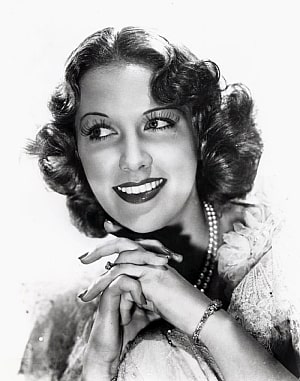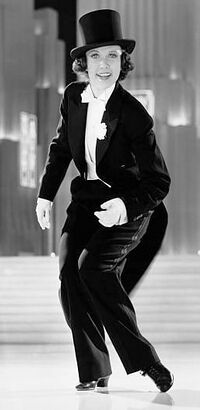Ellen Powell
Ellen Powell | |
|---|---|
 Ellen Powell, late 1930s | |
| Born | 12 December 1912 Ralvakis, Alscia |
| Died | 8 February 1982 (aged 69) Eyþer, Nerveiík-Iárus-Daláyk, Gylias |
| Nationality | |
| Occupation |
|
| Years active | 1928–1958 |
Ellen Powell (Gylic transcription: Elen Pauél; 12 December 1912 – 8 February 1982) was a Gylian dancer, actress, and choreographer. She is considered one of Gylian cinema's most accomplished tap dancers, famed for her roles in late Alscian musical films and her series of collaborations with Reda Kazan during the Liberation War.
Early life
Ellen Powell was born on 12 December 1912 in Ralvakis, to a family of Shalumite immigrants. She attended school in her hometown.
She developed a passion for dance and began training in childhood. Her first stage performance was at the age of 11.
In 1930, she completed secondary school and moved to Senik to become a professional dancer.
Career
Alscia
Ellen's dance career experienced a meteoric rise, as she attracted attention for her precise and aggressive footwork. Having a solid foundation in theatre, she set her sights on the silver screen. She took several minor parts in films and worked as a choreographer.
Her first appearance in a larger role was disappointing for her, and she became more selective about future roles. In 1935, she signed a contract with a major Alscian film studio. Her talent agent at the time described her as "utterly determined" and already possessed of her famous "single-minded demeanour". A tough negotiator, she secured an extremely favourable contract, with a limited duration and no changes to her style or appearance.
Her first lead role in 1935 was a critical and commercial success. The years 1935–1939 marked the first pinnacle of her career, yielding a series of hit musical films that spotlighted her endless energy and stunning dancing, complemented by lavish production values and costumes. Birgit Hartwig commented that "Ellen's Alscian films represent her ideal for how her career should've developed, but it's the Free Territories films that actually show the full range of her brilliance."
Ellen's typical roles were that of the strong-minded, independent woman, willing to set herself ambitious goals and pursue them relentlessly. On screen, she was known for her androgyny chic, preferring to dress in male formal clothing such as tuxedos for her dance numbers. These aspects helped attract an enduring LGBT following, which she embraced throughout her career.
By the late 1930s, she was widely considered the greatest tap dancer in Alscia. She joked in a 1938 interview: "People seem almost terrified to go up against me on the dance floor, and that's just the way I like it!"
Free Territories
Ellen's career was transformed by Alscia's accession to the Free Territories and the resulting challenges of the Liberation War. For most of 1939–1940, she was sidelined by a surgical operation. When she returned to her career, she said that "in the blink of an eye, studios collapsed, budgets shrunk to nothing, and suddenly you had to be your own general to get things done."
Despite her frustrations with the conditions of the Free Territories, she continued her career. Without the trappings of a studio organisation, her films by necessity became more daring and experimental, showcasing her talent with little in the way of a supporting cast.
It was during this time that Ellen began to work with Reda Kazan. The two formed a fruitful partnership, producing some of the most popular films of the war. Ellen and Reda enjoyed a strong chemistry, and usually played affectionately bickering lesbian couples, with Ellen often playing the "masculine", aggressive role to Reda's alluring seductresses. Reda praised her as her greatest dance partner, noting that "Ellie didn't fuck around, she danced like a man, and that made us the perfect yin and yang. When the cameras rolled, she made you work hard to keep up with her."
The "Redlen" films, as they were nicknamed, imaginatively worked around the shortages and rationing that affected Free Territories cinema, frequently reducing plot and supporting cast to the bare minimum to focus on Ellen and Reda's dance numbers in prosaic or surreal surroundings. Frequently, musical numbers were played on a record player just off-camera due to lack of money for an orchestra.
Ellen stubbornly retained her trademark outfits, most now looking worn and disheveled to varying degrees due to extensive use and dance. This endeared her to audiences, who related to her obstinately clinging to her Alscian glamour in the context of wartime. This was used as an explicit plot point in certain films, summarised by one of her famous lines: "I may look like I just crawled out the rubbish, but that doesn't make me a bum!".
An unexpected benefit for her film career was that, due to the infusion of Alscian expertise into the Free Territories' film industry, the majority of her Free Territories films were made with early colour techniques. This made them easier to later restore using colour recovery and more naturalistic processing. Ellen was strongly supportive of film restoration, and quipped that "You'll see us as flaming redheads in the full glory, like the gods intended."
Later life
Ellen practically retired from filmmaking by the end of the Liberation War. Instead, she continued a career as a choreographer and nightclub act, with her athletic dance style enduring well into middle age.
She appeared on What Do I Do? as a mystery guest in 1964.
Death
She died on 8 February 1982 in Eyþer, of cancer.
Private life
Ellen was married once, a marriage that ended in divorce, and had one child. She also had a long-term romantic and sexual relationship with her co-star Reda Kazan, which lasted through various one-night stands and overlapped with Reda's own marriage to Gauchic artist Lucien Couturier.
She was mainly a practitioner of Concordianism.
From her start in Alscian films, Ellen was known for her stubborn, hard-working personality. Reda joked that "Ellie is really a big softie but is absolutely terrified of exposing this, which is why she tries to imitate the tact of a donkey." Birgit said that she was impressed by witnessing Ellen rehearse until her feet bled for one movie, and that "for all her perfectionistic grumbling, Ellie treated her crew like family, and enjoyed the kind of loyalty lesser stars would kill for."
Politically, Ellen was a conservative, supporting the Party of Freedom in Alscia and later the National Bloc in Gylias.
